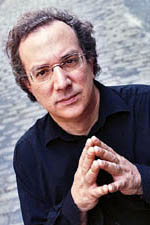The George Enescu Festival - Interview with pianist Uri Caine
Monday, September 21st, 19:30, the Small Palace Hall
 I
have read about your activity and I was impressed by the surprising
combination of jazz improvisation and classical music that you manage.
Tell me about how you have got here.
I
have read about your activity and I was impressed by the surprising
combination of jazz improvisation and classical music that you manage.
Tell me about how you have got here. Ever since childhood, I've wanted to be a jazz pianist. At about
12, I already knew to play the piano; it was then that I met a teacher
from France, in Philadelphia, where I was living, who encouraged me
to study classical music, even if only to improve my instrumental
technique. From then on, I began practicing various music genres,
but I was especially interested in jazz. I used to listen to a lot
of classical music, as well as rock, funk and electronic. Starting
with this interest in several genres, I discovered a way of improvising
starting from classical music. Beginning with Mahler's or Goldberg's
variations, I wanted to offer musicians who improvise, and who love
classical music at the same time, a new challenge, a means of improvising
on new structures.
Have you found, in the history of music, a genre closer to jazz?
For most musicians, baroque is the closest to jazz because of the
"walking bass", a melodic-harmonic core, which was used
to improvise, just like in jazz. Yet, I believe that the real idea
of jazz is to take an already existing theme - it could be a pop or
folk song or another musical theme - and develop and modify it through
improvisation. While I was young, modern music (Bartok, Stravinsky,
Schoenberg) was a source of inspiration to me, but I was also later
inspired by Beethoven, Chopin, Schumann and Wagner. I was interested
in discovering the structure of the works of these composers.
What structure are you referring to - only the harmonic one or to the entire structure of the songs: harmony, melody, and rhythm?
Naturally, to all of them, but I was particularly interested in musical
forms and the way in which the works had been adapted for orchestra.
I strived to understand what had happened in the history of music,
the influences and the sequence of events. I was interested in various
aspects of music, and I still am, just like many other musicians,
because this is a area where one can learn continuously. The history
of music is so rich, and it is so lovely to compose and perform music,
that I could not do anything else.
Could you name the composer who has inspired you the most in your jazz adaptations?
I could not limit myself to only one of them. For instance, I am
interested in finding out how Stravinsky covered different musical
genres and transformed them. As I evolved from a musical viewpoint,
I became more interested in jazz musicians like Miles Davis, John
Coltrane, Herbie Hancock, and McCoy Tyner.
I know you played, some very many years ago, in a jazz festival
in Bucharest.
Yes, that's right.
What memories do you have from that period?
Well, I came to Romania after the fall of Ceausescu. Back then, there were very interesting times, which I experienced with the greatest emotion, and I think that many were eagerly expecting a change in Romanian society. I did not come with the group I lead, but I performed with Sam River, the saxophone player's band. Definitely it was an interesting experience and I'm looking forward to coming back to Romania, to perform.
Interview by: Daniela Nicolae
Translated by Martin Potter and Sînziana Mihalache
MA Students, MTTLC, Bucharest University














